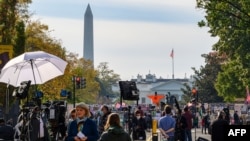Proposals to restrict how long foreign correspondents can live and work in the United States will make it harder to report on the American story and could expose journalists to retaliation in the U.S. or elsewhere, critics say.
Under plans by the Department of Homeland Security, the period that an I-Visa—the nonimmigrant permit that allows foreign journalists to remain in the U.S. for up to five years—will be reduced to 240 days. International correspondents will be able to renew the shorter visa at least once, but the proposal does not specify whether further extensions will be granted.
Currently, foreign journalists aren’t required to apply for an extended stay as long as they continue working for the same media organization. The I-Visa is valid unless a journalist changes to a new employer during his or her stay.
The DHS said it is hard to monitor holders of the five-year visas and said the changes--which will also apply to visas for international students and exchange visitors--are needed to encourage compliance, combat fraud and improve national security.
A statement in late September said the changes are “critical in improving program oversight mechanisms; preventing foreign adversaries from exploiting the country’s education environment; and properly enforcing and strengthening U.S. immigration law.”
In his campaign, President-elect Joe Biden said key sectors in the U.S. rely on immigrants and that he would reverse many of the policies introduced during the current administration.
A spokesperson for the transition team did not respond to VOA’s request for comment on whether Biden would seek to amend or overturn the DHS I-Visa proposal.
Groups including the Foreign Press Association (FPA), an independent press organization based in New York, say the DHS move will make coverage in the U.S. more difficult and could result in reciprocation from other countries.
During the official period for comment, the association released a joint statement with other media groups opposing the rule. It also plans to lobby elected officials, association president Ian Williams said.
A seven-month visa won’t allow foreign journalists to make proper arrangements when they arrive in the U.S., Williams, who is a contributor at The Guardian, told VOA. “You can't get a lease on an apartment for 240 days. You can't bring a spouse and children across for 240 days.”
Allowing journalists to report in the U.S. for a number of years helps them to better understand the country they are reporting on, Williams said, but reporting for 240 days will leave them in a state of uncertainty.
Dan Kubiske, co-chair of the Society of Professional Journalists’ international community, agreed.
“You've got to do a lot of different reporting, because America is so diverse,” Kubiske said. “America is so large, it is so different everywhere you go, that you can't tell short-term stories and accurately tell the American story.”
Williams says the number of media visas issued annually — around 11,000 — is not large enough to warrant such a restriction. There is no evidence pointing to the “fraud and abuse” of the immigration system DHS has alleged to justify the rule, Williams said.
For student visa classifications, which are also facing changes under the proposal, the DHS has a system in place to track schools, exchange programs and visa holders. The system does not extend to the I-Visa program.
The DHS has said the proposals are “to enhance national security.” It has also said that journalists would be able to apply for an extension directly with U.S. Citizenship and Immigration Services, or by leaving the country and applying for admission at the border. The processing fee for the I-Visa is $160.
Thanos Dimadis, director of the Association of Foreign Press Correspondents and Knight-Bagehot Fellow at Columbia Journalism School, said the proposed rule should apply only to foreign journalists on a specific assignment or covering a particular event, not to foreign correspondents who are permanent employees of media organizations.
While there could be possible abuses of the media visa if journalists fail to notify authorities they changed employers, foreign correspondents don’t pose a threat because they provide detailed documentation about their country of origin, status as a professional journalist and sponsorship by a media organization, said Dimadis, who has lived in the U.S. for 10 years, part of which was on an I-Visa.
A seven-month visa would impede correspondents’ ability to relay information about the U.S. to their countries of origin. Instead, the visa’s duration for long-term foreign correspondents should be at least two years, he said, with the possibility of extension for another two years.
“Being a foreign correspondent in the U.S. is not a part-time job. It's not an easy job, particularly for foreign journalists coming from much farther away, carrying a different culture and professional philosophy,” said Dimadis, who covered the Eurozone financial crisis from Brussels and Washington for Greek broadcasters. He added that it takes longer than 240 days for journalists to build a network, become familiar with the field of reporting and become trustworthy to sources.
Foreign journalist associations in the U.S. have also warned the proposal could result in hostile countries imposing visa restrictions on American journalists.
Journalists are already caught in a U.S.-China tit-for-tat over media visa restrictions, with governments on both sides taking action that impacted foreign reporters.
In March, the U.S. restricted to 100 the number of Chinese journalists working at state-owned media in the U.S. Two months later, Washington limited their stay to 90 days, with the possibility of an extension.
“China immediately decided, well, if you're going to do that to our publications, we're going to do it to yours,” Kubiske said.
Beijing earlier this year demanded journalists reporting for The Wall Street Journal, Washington Post, and New York Times hand back their press credentials, and imposed other restrictions on foreign outlets.
The DHS proposal will give China an excuse to further tighten restrictions on U.S. correspondents, Williams said. “Whatever we do to foreign journalists, they will feel free in doing to incoming American journalists,” he said.
Williams said the proposed change could also inhibit press freedom, especially for journalists from repressive countries. “The First Amendment seems to have got lost in the making of these proposals,” he said.
Kubiske said that more frequent renewals could allow the U.S. government to retaliate against journalists who are critical of the administration.
“If an administration decides they don't like the work of that reporter, they can then in that time period between filing for the renewal and getting the renewal, threaten to throw the reporter out of the country,” Kubiske said.
The DHS did not respond to VOA’s request for comment on claims that the proposal could lead to retaliation.
“The department is currently reviewing comments received during the public comment period and will take them into consideration when drafting the final rule,” a DHS spokesperson wrote in an email to VOA, adding that the rule is expected to come into effect this year.





